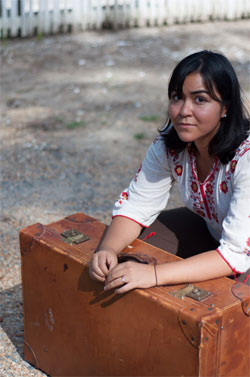 Age: 24
Hometown: Woodbridge, VA
Current Residence: Ashburn, VA
College of William and Mary, 2010
Anthropology and Math minor
Age: 24
Hometown: Woodbridge, VA
Current Residence: Ashburn, VA
College of William and Mary, 2010
Anthropology and Math minor
Meet Amanda Andrei, an Artificial Intelligence Engineer at MITRE Corporation.* Essentially, she does everything from building computer models to working on organizational change management with various government agencies in the Washington D.C. area.
Andrei, a multifaceted Fil-Am, is also well-versed in the realm of creative and performing arts, which has been quite influential in her life. Since high school, she’s been involved in acting, directing, making props and assistant producing. In her senior year of undergrad, she took a playwrighting class and wrote the award-winning play Every Night I Die, which is set in rural southern Philippines during the 1930s. It has had staged readings in Arlington, VA at Little Theatre on the Run, and has been performed at the 2011 Capital Fringe Festival and the College of William and Mary.
“It’s important in life, being able to tell a story,” Andrei reflects. “Theater is very fulfilling. I love creating for the sake of creating and touching the human soul. Theater is the most effervescent of the arts, so you never get the same show twice; it’s never the same [and only] there for that moment, so it’s really precious.”
When thinking about her identity, Andrei takes both her Pilipino and Romanian heritage into account. She writes for Asian Fortune, a newspaper based in DC. In college, Andrei yearned to learn more about the Philippines. She explored her connection to her roots while participating with the Fil-Am organizations at UVA and William and Mary, being actively involved in FIND, and while studying abroad at Ateneo de Manila University.
Andrei would like to see the Fil-Am and Pilipino community cultivate the arts.
“I’ve taken writing classes, and there have been times where I have questioned my identity in the writing of my pieces because I didn’t know if anyone understood, [and have thought to myself] ‘Should I be less brown?’”
While working with the Smithsonian and the Organization of Chinese Americans, she learned the importance of education, arts, culture and outreach. She envisions this for the Fil-Am community in the DC area, particularly with the establishment of a safe space or program where Asian Americans and others can be trained in performance and writing.
“We need more of those voices and perspectives. It doesn’t always have to be about the Philippines; I’d rather have someone tell a good story,” notes Andrei.
Andrei offers the following advice to fellow Fil-Ams and Pilipinos.
"Don’t be afraid to spend money on your heath,” adds Andrei. “I pay for [and use] a monthly pass to the yoga studio, have acupuncture done and eat healthy."
"If you’re still in college, take some technical courses, such as math, computer science, or GIS. You may not like it, but to survive in today’s world, you should have that component,” Andrei advises. For those studying just hard sciences, don’t be afraid to get a minor in something else. “You need to have an interesting combination. Mix it up!” notes Andrei.
“Carve out your own space. You don’t have to do what everyone else is doing. No one I know really has it all; if they do, they’re really lucky. If everyone’s telling you what you have to do and what you have to be, remember to be true to yourself. Be practical, but still allow yourself to dream. Be open to the universe."
Photo credit: Dan Tran
--
*About The MITRE Corporation
The MITRE Corporation is a not-for-profit organization that provides systems engineering, research and development and information technology support to the government. It operates federally funded research and development centers for the Department of Defense, the Federal Aviation Administration, the Internal Revenue Service and Department of Veterans Affairs, the Department of Homeland Security, the Administrative Office of the U.S. Courts, and the Centers for Medicare & Medicaid Services, with principal locations in Bedford, Mass., and McLean, Va. To learn more, visit www.mitre.org.





